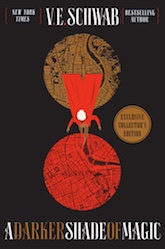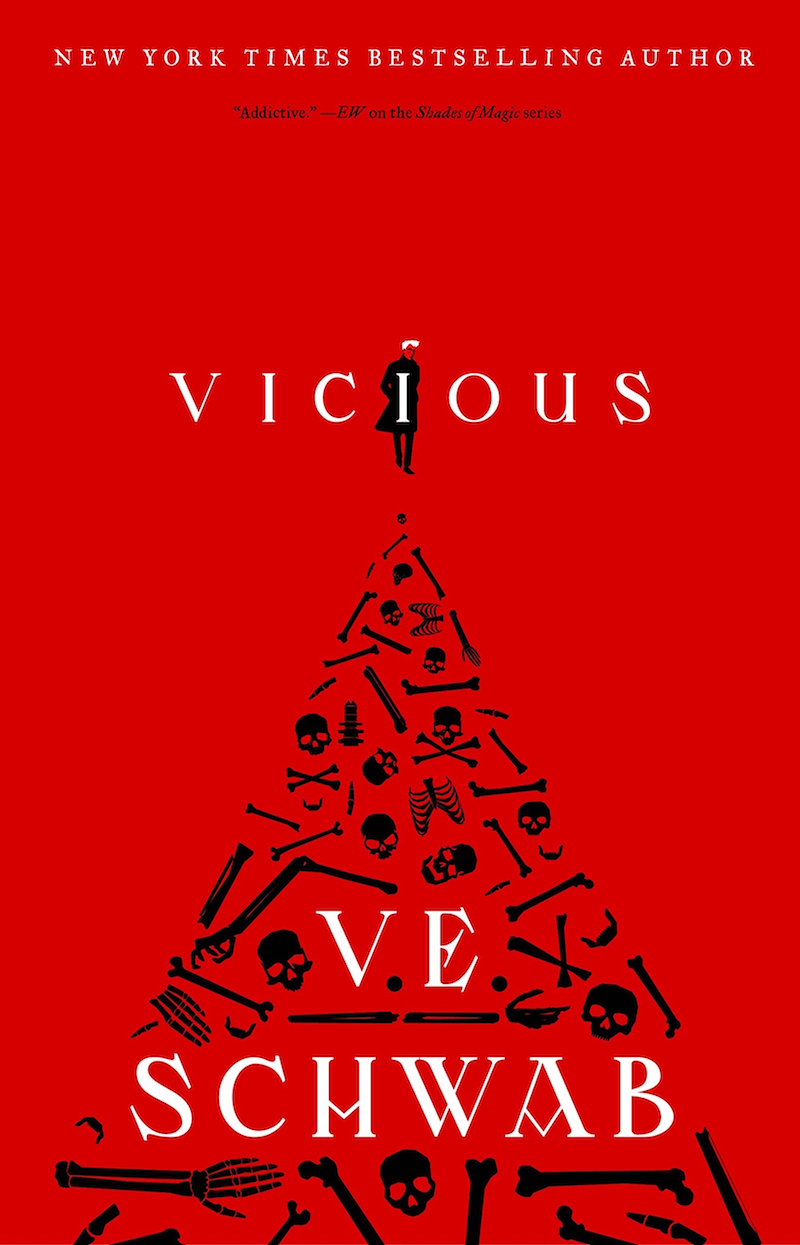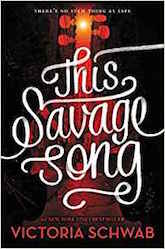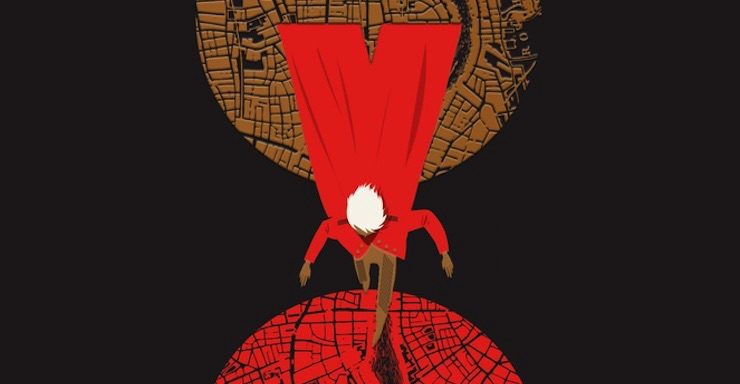Say you’re with your sibling, lounging next to a little brook beneath the boughs of a willow tree, like Alice before Wonderland. Like Alice, due to your sibling’s droning on about a subject you couldn’t care less about, you eventually lapse into sleep.
Upon awakening, you suddenly find yourself in an unknown landscape; unlike Alice, the landscape isn’t Wonderland. Instead, it’s a world resembling those V.E. Schwab masterfully depicts in her own fantastical tales. Not only that, but you’ve been transported to this imaginative realm to play the part of the protagonist in the next tale which she is crafting.
How can you be sure, though? And what can you expect? (Cue the Twilight Zone theme).
If you ever remotely anticipate something like this to transpire in your life, in a non-metaphorical manner, here are a few hallmarks of which you should remain aware upon entering the Schwab-verse.
An Urban Playing Field
How will the actual environment appear? Will it be a faux medieval wannabe Europe, or a truly singular landscape straight out of a mushroom dream?
This will likely be the greatest factor in your initial discombobulation, for the new world you awake in will appear startlingly similar to your own. Cities, riddled with great skyscrapers, public transport, electricity, and, most importantly, indoor plumbing. It may very well resemble a city you’ve heard of or even visited—like London, with a Thames-like river and everything. Or, it may indeed be a dystopic futuristic city, divided by civil war, like V-City.
Don’t be fooled by this facade of familiarity.
It hides many unfamiliar, and often threatening, forces. Around every corner could be lurking a person who appears ordinary but who may, in fact, possess extraordinary abilities. The shadows might conceal beasts out of nightmares, or from beneath the beds and dark closets of children, like a Corsai or a Malchai. There may even been gateways to other worlds beyond the one you presently occupy—gateways that you may or may not be able to see or access.
Sometimes a wall might be a wall. Other times, it could be a threshold to somewhere else entirely.
Knives and Lots of Them
Had you been transported into the landscape of a Western, or a City of Hardboiled Crime, chances are that eventually you’d find yourself staring down the barrel of a gun.
Buy the Book


A Darker Shade of Magic Collector’s Edition: A Novel (Shades of Magic)
This is a land in the Schwab-verse, though. Here, you’ll been staring down the edge of a knife—or perhaps you’ll find one being held against a part of your anatomy where vital arteries reside. (You may want to protect your neck.)
Sometimes, they’ll be discreet knives, such as Kate Harker’s unique lighter with a built-in retractable blade. Other times, they’ll be commonplace, like a kitchen knife—such as the one Victor Vale first used to slice into his friend-turned-foe, Eli Ever. It could even be a unique and elegant dagger…maybe one of a set belonging to a clever pickpocket.
Regardless of the blade’s appearance, you’re bound to encounter one or more of these weapons eventually. Don’t worry, though. You’ll likely have one too, and you’ll know how to use it.
There will be Blood…and Lots of It
Wherever there are sharp objects, there will be injuries: cuts, scrapes, scratches, gashes, stab wounds, and lacerations (depending on their severity). And where there are such injuries, there is always blood.
As the protagonist of this Schwab-verse story, you’ll be losing lots of it. Authors must be a bit sadistic towards their characters, otherwise there’d be no conflict, no drama, no change, and therefore, no story, and the creator of this particular universe is unafraid of bringing the pain. Your fate will be no different.
Chances are you’ll nearly bleed to death several times throughout the story, mainly for the sake of kindling fear in the Truman Show-esque audience enjoying your misery; for example, the time Kell nearly died the death of a thousand cuts by Holland’s hand in the streets of Grey London. Still, Schwab won’t let her characters off that easy, by simply dying. (Where’s the fun in that?) She’ll insure that you linger on, battle-worn but breathing. She’ll also provide you with numerous opportunities to avenge yourself against those who did you harm, leading up to an exciting final showdown.
It is advisable, however, to be on your guard towards that climax of your narrative. You may be her latest protagonist, but it doesn’t mean you’ll get that golden ticket of surviving all the way to the end.
Sadistic Antagonist
As previous stated, authors sometimes have to behave like sadists towards their characters. “Happiness writes white,” as the old saying goes.
To aid the goddess of the Schwab-verse in her efforts to keep you in trouble, she will very likely deploy against you your ultimate antagonist: a sadist for an enemy. In fact, it’s quite likely that this very adversary will cause you to suffer extreme blood loss, and may nearly kill you. How would you like to have your own personal pair of Dane Siblings, or even better, your very own Sloan—monsters (literally in Sloan’s case) who want nothing more than to snuff you out of existence and will get a thrill out of doing it? Or how about someone like Marcella Riggins, who’d love nothing more than to burn you to ashes if you dare to underestimate or undervalue her?
Well, you won’t be getting these spectacular nemeses (they’re already taken)—but you’re sure to face your own, and they’ll be just as bad.
As with everything, however, there is a catch: Your enemy will not think they’re a villain. That would be far too simplistic for the denizens of the Schwab-verse (maybe see Tolkien for that). Instead, they’ll view you as the real villain and themselves as the hero. This makes them even more dangerous than a classic, moustache-twirling Snidely Whiplash-style baddie. They will not be evil for evil’s sake. They’ll have understandable motives, something that drives them to do what they do because they believe it to be right. And they will do whatever’s necessary to achieve their own goals. Likely, what they have to do will involve you being in a lot of pain. And not just physical pain, but emotional as well.
Magic—With a Price
One thing that will increase your likelihood of surviving even the worst scrapes—besides your knife-wielding skills and innate competence—is that the capricious goddess in charge of this story will grant you one thing your ordinary life never could: real magic.
It never hurts to know the basics of sleight of hand, especially if you enjoy pocket-picking, but real magic will give you an edge.
Again, though, there’s a catch.
Buy the Book


Vicious
This isn’t J.K. Rowling’s Wizarding World, where you merely need to learn the right spell and know how to wave your wand to use magic (after a bit of practice, of course).
This magic, to quote Once Upon a Time’s Rumpelstiltskin, “comes with a price.” Exactly what that price is, you’ll have to find that out yourself. But be warned: it’ll never be an easy trade.
If you want an extraordinary ability, you might have to bring yourself as close to death as Victor, Eli, and the Clarke sisters all did, only narrowly making it back. Afterwards, you’ll have to figure out what your power is and how to control it. Plus, you’ll have to learn to cope with a slightly more sociopathic personality.
Or if you’re lucky enough to be someone with magic in your blood—an Antari—you’ll have to be willing to pay a tribute of blood each time you wish to call upon your power.
If an act of human cruelty or violence brought you into your Schwab-verse world, like the Sunai August Flynn, your creator might grant you great powers of destruction. However, the only way for you to use those powers will be for you to take human life, and with each use, you may very well lose more of your own humanity.
The abilities can be remarkable, but is the cost really worth the power—power that can fail you or change you for good each time you use it? That’s a question you’ll frequently have to ask yourself, in this world: is it worth it?
If you over do it, you may risk becoming nearly unrecognizable from your own crazed archenemy.
On the Outside, Looking In
You now know quite a bit about where this story will take place, and you know what kinds of things you’ll see and experience. That still leaves a question hanging. What about you? What kind of person would find themselves at the center of a Schwab-verse story?
No matter what type of society you find yourself in, chances are high that you’ll be one of the people occupying its fringes. Every society has its insiders and outsiders. You shouldn’t feel bad about being one of the latter, however; they’re often the most interesting kinds of people.
Outsiders stand out as unique, with the greatest abilities and most cunning minds, like Kell or Lila. And because they stand apart from the majority, they possess an innate understanding of how their world functions—the benefit to standing on the edge is that you’ll have the best view.
Indeed, you may suffer from a sense of displacement and thoughts of longing, a sense of yearning for the place where you think you should be or wish to be, as both August and Kate feel. You’ll even frequently wish you could just conform or disappear—something that, deep down, Eli Ever feels. Don’t allow these dark thoughts to fog your mind, though. You’re unique, and therefore, you’re worthy of being the story’s center.
Moreover, you need not worry about one thing: you won’t be ostracized for what you are.
In the world you come from, people are often looked down upon or hated for various aspects of who they are. People from your home-world frequently suffer because of the color of their skin, their cultural or religious upbringing, or because of whom they love.
So long as you remain in the Schwab-verse, however, you won’t experience any sort of prejudice due to these facets of your character. Rhys, for example, is a person of color, which is the norm in Red London. He is also openly queer, something that never becomes a source of conflict. It’s simply a part of him.
The different elements of your identity will be accepted as all part of who you are, here; they will never be the source of agony. Instead, as we’ve seen in the entries above, you’ll be grappling with an entirely different set of problems.
No He-Men or Distressed Damsels
No matter what sex you are, how you identify in terms of gender, or what your preferred pronouns are, you won’t be stereotyped in this world.
Traditional fantasy has a history of casting male protagonists in the role of the noble, selfless hero. This sort of figure is also brave, loyal to his allies, and unwilling to take any action that requires traversing the low moral ground. They’re also typically depicted as being equipped with some kind of sharp-edged phallic weaponry (of which you may make what you wish) which they use to quickly dispatch their foes as the narrative requires.
Buy the Book


This Savage Song
Along with these noble Sirs and swordsmen are their counterparts: the helpless women in desperate need of saving. These poor fictional ladies find themselves at the mercy of dark lords, warlords, or archenemies of the heroic sword-slingers, and usually imprisoned at the top of a tower, trapped in a cage and soon to be fed to a tooth-filled mythical monster, or about to be sacrificed to bring some sort of Big Evil back into the world. They completely lack any agency and function in the story merely as the prize to be won at the tale’s end, Super Mario Bros.-style.
Since the introduction of greater realism into this genre of imagination, however, such archetypes have been set aside in favor of more complex, nuanced figures who more accurately reflect the complexities of human nature. These are not only the kinds of characters you’ll encounter in the Schwab-verse, but also the kind of person you will be.
You will have your positive qualities, though they won’t always be what you might expect.
You may indeed be a man, but you won’t traffic in toxic masculinity. You might be brave, but you won’t be brash, obnoxious, or plagued by the urge to obsessively show off and prove your manhood. You may be loyal, but you’ll also be pragmatic and thoughtful, in the same way that Kell, Victor, and August are. Above everything else, you will be fully aware of your feelings (and so will the people who experience your story), and, if you’re with the right person, you won’t be afraid to let those feelings show.
If you’re a woman, you certainly won’t be a helpless damsel. You’ll be a badass, like Lila, or Kate, or Sydney (once she comes into her own). You won’t think twice about taking matters into your own hands and actively trying to solve whatever conundrum in which you find yourself. You will have the initiative and agency to stand up for yourself, whether it’s your life or your dignity at stake.
No matter what your gender identity is or how it’s expressed, you will be seen as a complex whole—meaning that you’ll have your flaws and foibles along with your admirable traits. You may indeed be a brave young man, but you might also have a selfish streak or a vein of self-hatred running through you. You might be a woman with ambition and agency, but perhaps you’ll also have a cruel and manipulative personality.
The point is, no matter what you are, you won’t be a flat, static character. You’ll be a flawed, but interesting, individual.
In short, you’ll be a person.
Eventually, of course, your story will come to an end. You’ll wake up, next to the bank of the brook, with your dull, droning sibling berating you for falling asleep. But you’ll still have your experience in the Schwab-verse, and all the stories and characters and settings one can find there, forever.
Ian Martínez Cassmeyer was once described as “a quiet fellow, who is also amazingly articulate.” You can see examples of this on his blog, Ian’s Two Cents, and on Twitter (@Ian_SMC).










